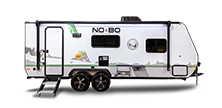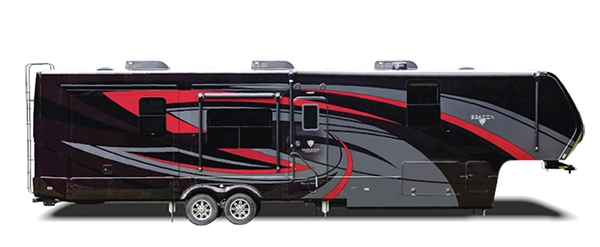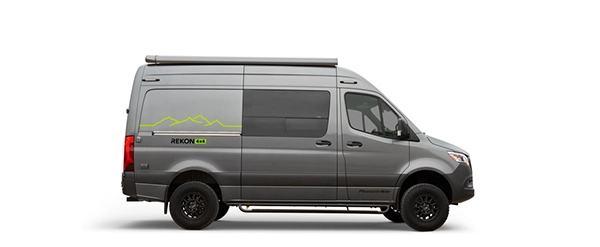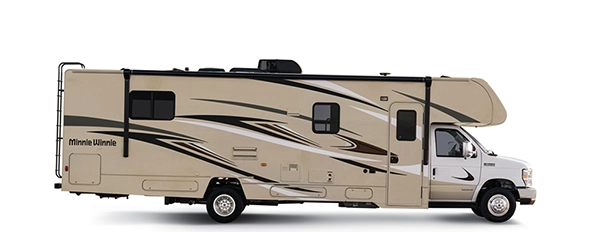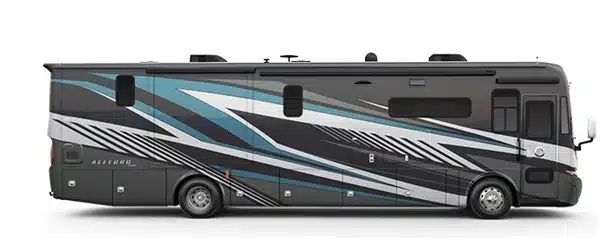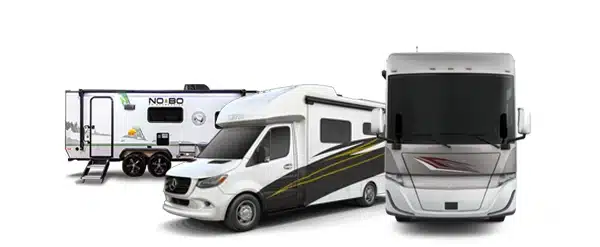If you’re in a quandary about which RV is right for you, here’s a handy guide to help you decide. Both Super Cs and Diesel Pushers are High-End and Feature-Filled, but there are real differences that can make one the stand-out for your lifestyle. Here are the biggest factors to help you decide.
Diesel vs. Diesel
If you’re looking at both Super Cs and Diesel Pusher Class As, then you have already decided one important factor: Power. Diesel engines provide it is abundance. But the real question is what you want to do with all that power.
This usually comes down to whether you want more storage capacity, or you’re looking for more towing power.
If you need towing power, the Super C is clearly the winner. Most Class A Diesel Pushers tend to max out at 10,000 pounds of towing power. Super Cs can tow 20,000 or 30,000 pounds, or sometimes even more.
If what you’re looking for is storage capacity, there’s generally not as much storage in a Super C as you get in Class A diesel pushers. This is due to the engine placement.
In a Class Super C, the engine is up front. To transfer power, there has to be a drive shaft that comes through the RV. And it extends back all the way to the rear wheels. Because of that, the drive shaft takes up vital pass-through storage area.
In a diesel pusher you don’t have that issue because the engine’s in the back pushing the rig. So then, there’s no drive shaft going in between the two axles. As a result, you have complete pass-through storage along the underside of the coach.

Engine Front or Engine Back
This is an issue that really helps people choose because the differences caused can be so stark.
As stated above, having an engine in the back of a Class A allows for greater storage area given the lack of a drive shaft. Likewise, that can also allow for more headroom and space in the coach in general, deeper slide-outs, and wider structures. More room can often mean more room features like bigger bathrooms, dishwashers and washer/dryers.
In addition, there’s simply the length the engine takes up at the front of a Super C. A forty-foot Super C will simply not have as much room inside as a forty-foot Diesel Pusher.
On the other hand, servicing a Super C is as easy as driving into a garage that services commercial diesel trucks. The engine is easily exposed and familiar to truck mechanics. A Diesel Pusher will require specialist RV service. While we at Poulsbo RV have all the needed tech and Master RVIA service experience, an ordinary diesel garage will often not even consider working on a Class A. They would have to go in the back bedroom and lift up the floor in order to access the engine. Most garages are not willing to even try.
Driving
That first quarter mile in any new RV is always intimidating. Some feel immediately more comfortable and safer in a Super C due to the enclosed feeling of a truck cab. It feels familiar if you’ve ever driven a pick-up truck—just bigger.
We have found that most people getting into a Class A feel less secure for that first drive to the gas station. It feels so open and other cars are *right there*. But in general, most people get the feel for it fairly quickly. Most.
In either case, given the current driver assist technology available for both classes, both are safe and getting safer to drive. It’s all about preference.
In the end, a test drive is your best option to see what feels right for you.
Comfort & Noise
In terms of a comfortable ride, there is a difference. Super Cs are built on a commercial type truck chassis. So they tend to ride more like a commercial truck.
Class A Diesel Pusher is known and loved for the ride. Generally, they have higher quality suspension systems. With that nice air suspension system as you’re going down the highway, you’re floating as you go. It’s the very definition of a comfortable ride.

Noise can also be a problem in a Super C as well, just because of engine placement. The engine is right in front of you, as opposed to an engine placed thirty feet behind you.
Admittedly, some people truly enjoy the sound of that big, powerful engine. For you, the noise is a feature, not a fault.
As for the horn: Super C wins. No notes. Sorry Class As.
Sleeping
Class Cs, in general, are seen as the “Family Friendly” model of RV. And there is that sleeping space over the cab which the kids just love. Most Super Cs follow that line of design and provide lots of sleeping space.
It’s a tradition, after all.
But for sheer number of models available, Diesel Pushers have an almost 10 to 1 advantage; many designed for couples seeking luxury, but a fair number of bunkhouse models are available as well.
In this case, it’s a toss-up. If you need more sleeping spaces, you can find them in either Super Cs or Class As. Oh, but there’s those fond over-the-cab memories to gift the next generation…

The Verdict
In the end, it’s always going to depend on your personal lifestyle needs. Both of these RVs are the best-of-the-best. Either one will bring you years of joy and adventure. When you come in to Poulsbo RV, there will be a knowledgeable staff member who will help guide you to the best fit for you. Focus on one or try them both!
Safe and Happy Camping to you!






















































